If you’re a new RV owner, you may ask yourself if it’s legal to park your RV in front of your house or even in your backyard.
The answer is maybe.
While there’s no federal law that forbids parking your camper in your yard or on personal property, you need to know the rules in your area for parking recreational vehicles on residential land.
Each county, city, or subdivision HOA has different regulations regarding storing extra vehicles on your property. If you don’t follow them, you can end up with fines or having to move your RV to a storage lot and pay a monthly fee.
To help you wade through all the information about backyard RV parking, I answer as many questions as I can that will guide you to the right answer for your situation.
Being able to park your RV in your backyard saves you money and time and gives you peace of mind that your camper is safe. So keep reading to find out the right way to go about parking your RV in your yard.
Is It Legal to Park My RV in My Backyard?
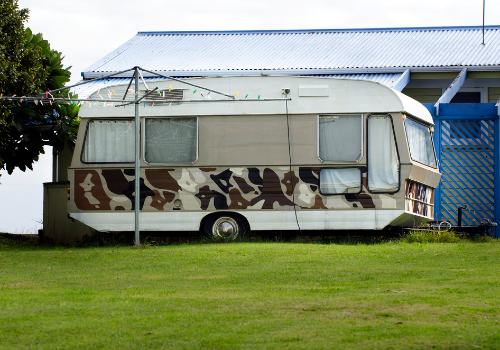
The rules are endless when it comes to what is or isn’t legal for parking an RV in your backyard, sideyard, driveway, or empty lot you privately own.
Rural areas tend to have fewer RV parking restrictions than cities. Some subdivisions ban RV parking of any sort, while others allow it if the camper is hidden from the sight of neighbors and the street.
Some areas allow RV parking on residential lots for a short period, while others have no restrictions on how long you can store your camper in your backyard.
If you live under the rules of an HOA in your neighborhood, they’ll probably make your life unpleasant if you own an RV and park it on your land.
All of these rules lead to one important fact:
Most people buy an RV with little thought given to where they will park it.
You cannot overlook planning where you will store your RV between trips. Even the smallest pop-up or camper takes up quite a bit of space.
The excitement of that huge motorcoach or fifth-wheel quickly loses its luster when you find out you can’t park it in your backyard or driveway and must instead pay a hefty monthly storage fee in an unprotected lot twenty miles from your home.
Where to Find Local Laws on RV Parking in Backyards or Private Property
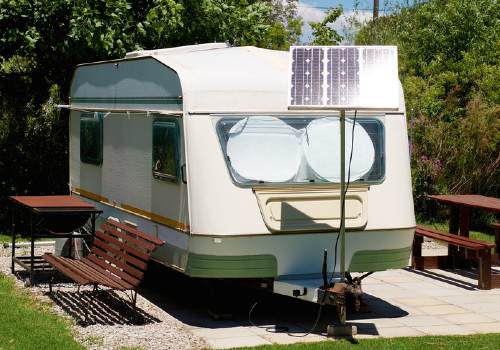
First, let’s be very clear that this article is about parking your RV and not living in your RV in your backyard.
The rules for parking an RV are usually different than the rules for living in a camper.
Placing an RV in your backyard and then letting someone live in it requires sewer, water, and electrical connections that are a whole other can of worms I will not get into here.
Follow this chain of authority to learn if you can park your camper in your backyard without problems:
Visit the County Courthouse
I recommend an in-person visit or call to your country courthouse’s zoning office. Ask directly about laws governing RV parking on residential land within the county and your particular city. Visiting the local zoning website may lead you to a wall of laws and regulations you may not fully understand about recreational vehicle parking within your city.
Ask about time limitations. If they indicate you can only park an RV for, say, three months in a row, ask how long the camper must be gone before you can bring it back for another three-month stint.
If the county doesn’t allow any long-term RV parking on residential land, you can then spend your time searching for the best storage lot for your camper.
They may tell you it’s okay to park the camper in your backyard as long as it’s in a building or hidden from view. You may need to provide a solid surface under the RV to prevent oil or fuel spills from soaking into the ground.
No matter what you are told, follow the rules, as you could end up with a hefty fine if you don’t.
Check-in With City Regulators
If your town has an office, stop in or call to inquire about parking rules for RVs in your yard. You may need a special permit or proof that your camper has a proper title and current registration.
As each locality has unique rules, you may need to do something different than your brother over in the next town who parks his RV in his backyard.
Check with your Home Owner’s Association
If you live in a subdivision run by an HOA, go directly to the head of regulations and get a printout of the rules for parking large items such as RVs or boats. Read them very carefully. Many HOAs discourage any RVs from parking in driveways and yards. If the association does allow it, you may have to completely shield the view of the camper from all angles of your property.
What that means is that you may stand in your driveway and not see your motorhome in the backyard, but your next-door neighbor can see it clearly from his back patio, which won’t fly.
The hassle of shielding an RV in the backyard may be too much to deal with, and using a storage lot may be the best solution.
Whatever you do, don’t rely on word-of-mouth from family or friends about what is legal or permissible for parking RVs.
Just because someone has their camper parked in their yard for a year and no one has bothered them doesn’t necessarily mean it’s okay for you to do it.
Ideas for Parking Your RV at Home
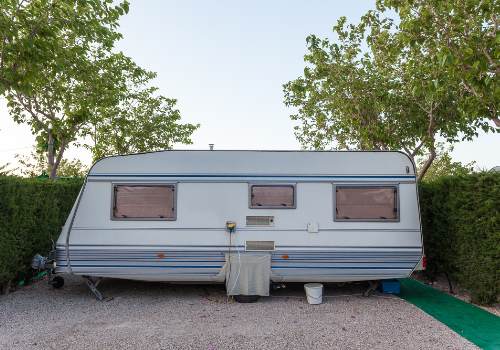
Parking an RV at home may or may not create issues depending on how large your lot and driveway are.
Even with the legal right to park your RV in your driveway, you may find it looks terrible or gets in the way of parking other vehicles.
Parking the RV beside your home may work if you don’t use that land to access the backyard, but even that area may detract from the curb appeal of your home.
Most RVs are over eight feet tall, with some reaching 14 feet or more when you add in the height of the air conditioner.
You won’t be hiding most RVs behind a 6-foot fence, and many zoning laws prohibit fencing over 8 feet in height, so what can you do to make your RV look less of an eyesore when you park it in your backyard?
Create a Paved RV Parking Area
When parking your RV in the backyard, the first thing you want to consider is to provide a level, solid surface for it to sit on.
Not only will this avoid the nuisance of having to mow and trim around and under the camper, but it will put less wear and tear on the tires.
It may also be a local requirement that any RV parked on residential property is on a cement or asphalt pad for environmental reasons in case of leaks.
A bonus of having a concrete pad under your camper is that it allows you to store camping gear in totes underneath the RV. This tip makes it easy to access your supplies when packing up for trips, keeps them safe from the elements, and saves on storage space in your home, shed, or garage.
Build a Cover Over the Camper
The best way to protect your camper investment is to put a roof over it if you park it in the backyard.
A roof will:
- Stop sun, rain, hail, snow, and ice from hitting the RV
- Slow down the deterioration of roofing and caulking materials
- Keep paint and decals from fading and cracking
- Provide protection from the elements when loading and unloading the camper
- Create an instant outdoor entertainment space when your camper isn’t parked
While pre-fab metal covers, like the Arrow products sold by Northern Tool, are quick to install, the look of them may not suit your taste.
For about the same cost, you can buy affordable plans from Etsy or other online sources and have a local builder erect a post and beam structure to fit the size of your RV.
Want to Connect With a Community of Over 1,078 RV Enthusiasts?
These structures look quite classy and are much more durable during intense storms. The building is also much easier to convert into a screen room or extra garage if you ever sell your RV.
Build a Fence Around the RV
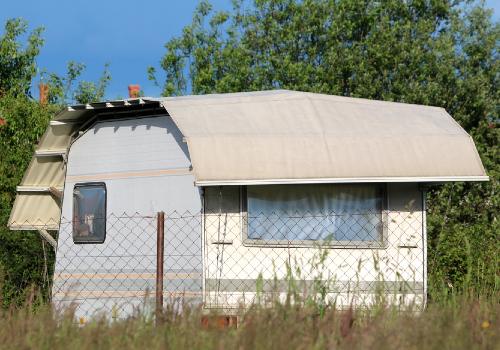
Even if you have a fence enclosing your backyard, you may wish to shield the RV behind a separate fence to conceal it from general view while enjoying your backyard space.
Fence panels can soften the harsh look of a big camper in your yard and provide a barrier to keep children or pets away from your RV.
No one wants their camper used as a wall to kick balls against or the wheels as a target for Fido’s potty breaks.
Painting the fence or adding decor to the outside can also brighten the look of your backyard.
Plant Foliage or Potted Plants Around the Camper
A row of potted ornamental trees, palms, shrubs, grasses, or flowers can distract the eye away from a bulky backyard RV but can be moved out of the way when you want to take the camper out on a trip.
If you have space to move the camper without having to move plants, consider alternating tall-growing inground plants with trellises you cover in bougainvillea or ivy.
This blend creates a beautiful “wall” that looks natural and isn’t as intense as a solid fence.
Make Your RV a Focal Point
If you have a cute travel trailer or RV and some extra space, why not go with the flow and set up your backyard to look like a campsite?
Once you park your camper on the cement pad, add a patio space next to it that you fill with lounge chairs, potted plants, a table with an umbrella, a fire pit, or even your grill.
Pretend your RV is in use and set up the area to open up from the camper’s door. This idea is also perfect if you plan to allow people to sleep in the RV on overnight visits occasionally.
FAQs About Parking an RV in Your Backyard
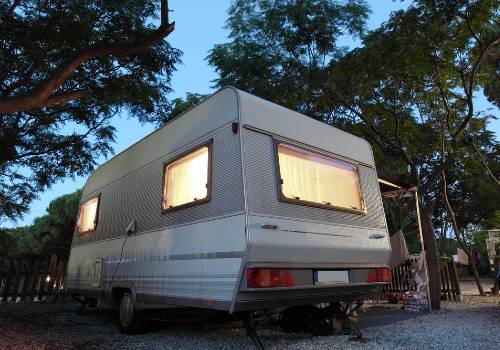
What Type of Regulations Can I Expect if I Want to Park My RV in My Yard?
RV parking regulations in some jurisdictions look like a bunch of mumbo-jumbo, but this page from San Dimas, CA, is a good example that clearly shows what is acceptable.
Usually, the issues for parking your camper at your house are:
- Distance of RV from the street, front of house, fences, or neighboring property
- Keeping RV out of sightlines
- Not parking RV on grass, dirt, or gravel (solid surface parking only)
- Not using the camper for inhabitation
- Timeline of camper parking
- Permits or proof of current camper registration
Is There a Time Limit for Backyard Parking of an RV?
Luckily, if your local rules allow you to park your RV in your yard, there are rarely any timelines for how long you can store it there.
You may have to update and pay for a parking permit yearly.
Many HOAs only allow a camper to be parked in a driveway or yard for a few days at a time, with a yearly limit of two or three weeks a year.
Conclusion
Don’t make the silly mistake of thinking if you own your property, you can do with it what you want, including parking your RV in the backyard.
Hopefully, you can do so without and problems from local zoning regulators, but doing your due diligence and finding out precisely what you can and cannot do with your RV will save you many headaches.
Suppose you’re serious about being an RV owner and plan to keep your camper on your property. In this case, I suggest you avoid buying a home in a metropolitan area or one under HOA control as they have the most restrictions on RV parking.
I hope you found this article helpful for learning about the rules for parking an RV on your land and that you use the tips to make your backyard space more attractive with or without an RV!
RV Parking: Can You Park an RV on Your Property? (Video)
"Man cannot discover new oceans unless he has the courage to lose sight of the shore."
-- Andre Gide

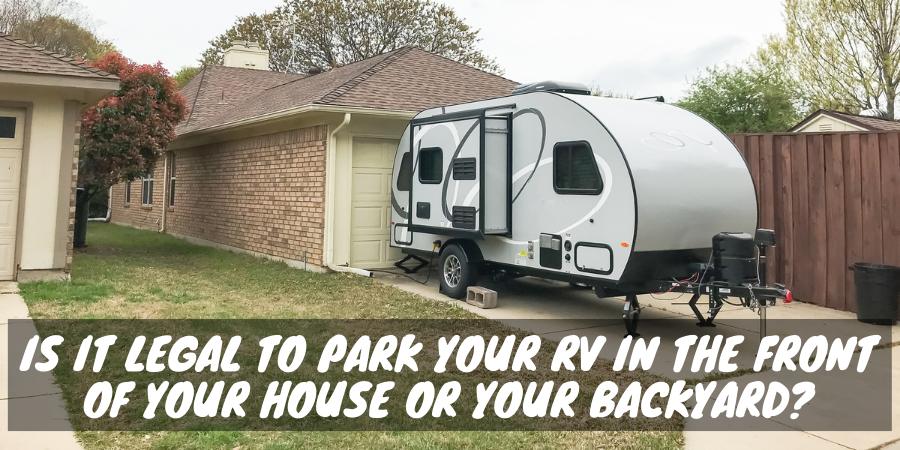
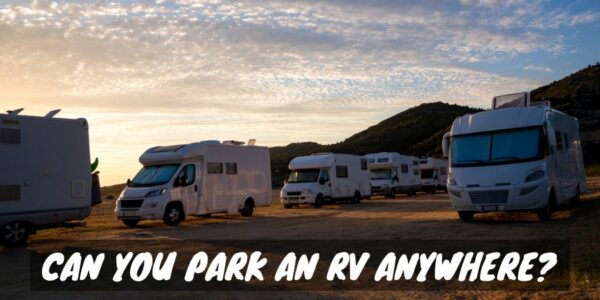
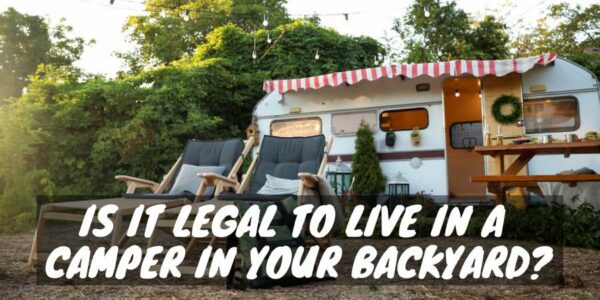
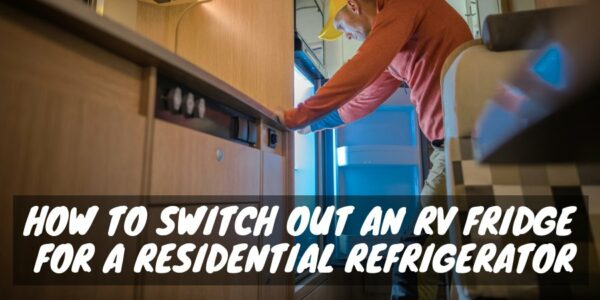

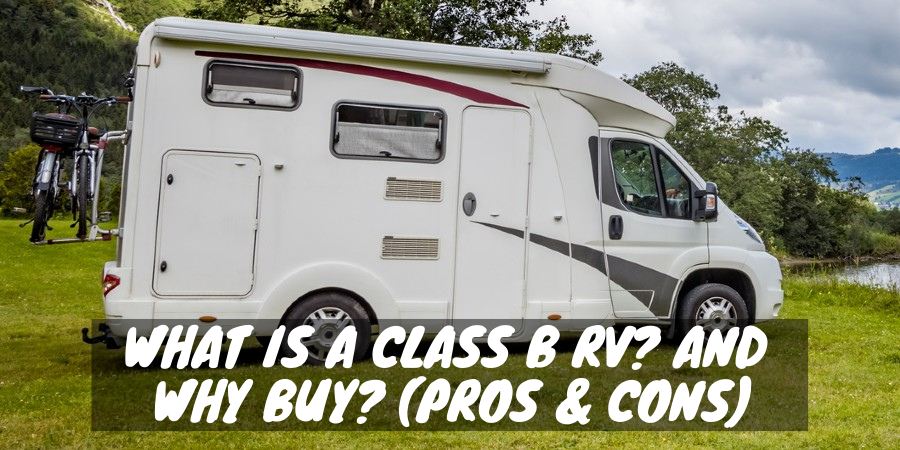


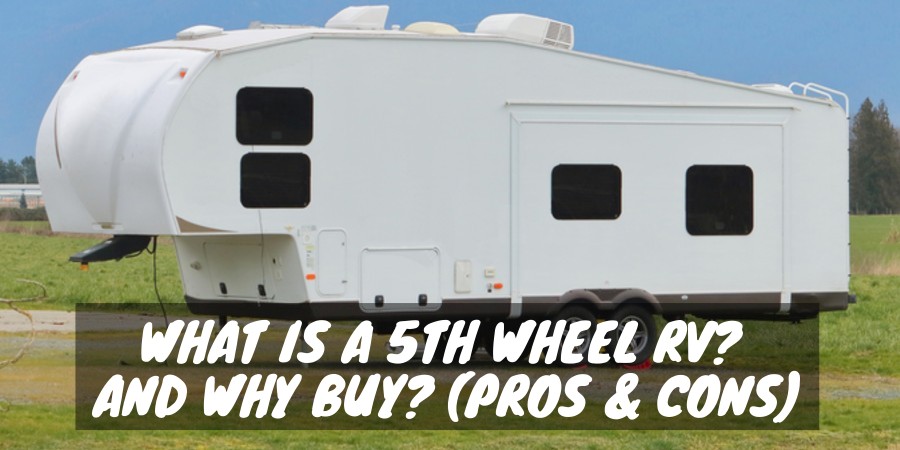
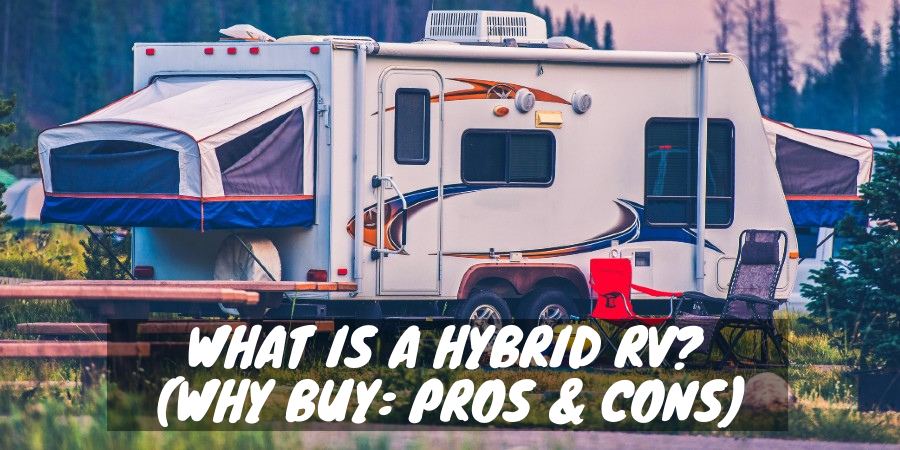
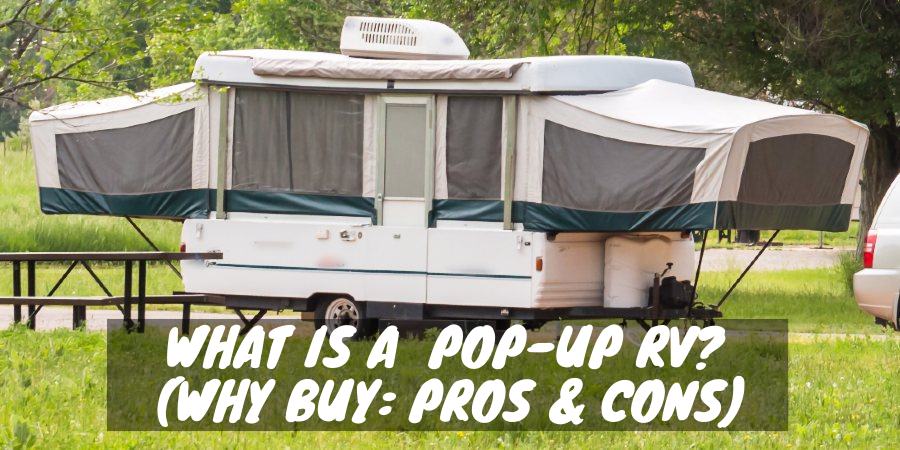
Unknown RV parked in front of my house ?
neighbor parking rv on side yard near my fence and st
The terrible people who live next door to me park their RV 5 feet away from my house, blocking the kitchen and dining room windows. I asked how they would like it if someone did this to them. Their response: “next time, don’t buy a house next to a driveway.” We bought our house 12 years ago and did not anticipate jerks moving in next door, but 3 years ago they moved in and they do not care if we are bothered by having to look at their big plastic RV instead of the view of the trees and the river.
My neighbor park a 30ft rv 14 feet tall ..2ft away from the fence is being rented to a family. I have no privacy in my backyard since they always have the blinds open. They are always looking over my yard ..all I can hear is the rv running ac
How many RVs can you park in your yard in Ohio, a neighbor has 3